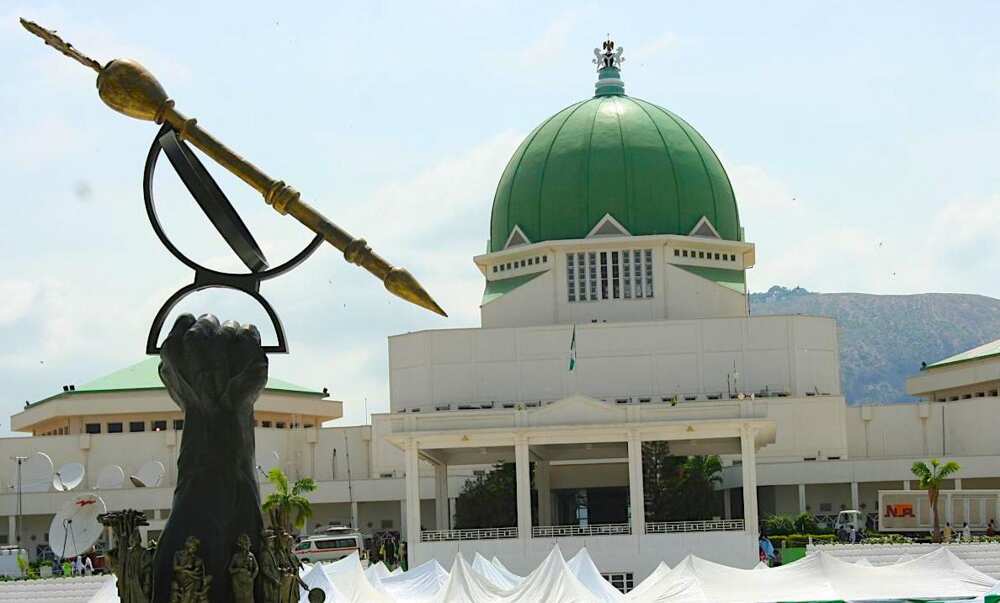10th Assembly: Don't Bring Religion Into Parliamentary Race by Ibrahim Tajudeen Olawale
Editor's note: A public affairs commentator, Ibrahim Tajudeen Olawale, who hails from Kwara state, writes on the lobbying and scheming that has been prominent in the race for who leads the Senate and House of Representatives in the incoming 10th National Assembly. He can be reached at olawaleibrahim@gmail.com.
PAY ATTENTION: Click “See First” under the “Following” tab to see Legit.ng News on your Facebook News Feed!
The legislature, as an independent arm of government in a democracy, has always been run devoid of religious sentiments due to its unique role as a check on the executive arm. To focus on the need for legislators to be patriotic, leaders of the parliament are selected based on ranking and the ability to preside over an array of lawmakers for the good governance of the country. For some years, this has been the practice in the federal legislature in Nigeria such that it never bothered Nigerians the composition of the legislature's leadership.

Read also
2023 presidential elections: Peter Obi blasts US APC over comments on Obidients' White House Park protest

Source: UGC
In the 1st Republic, the southeast produced the Senate President and the Speaker of the House of Representatives in the persons of Nnamdi Azikiwe and Jaja Wachukwu simultaneously who were both Christians. After Azikiwe, two other persons from the south, Chief Dennis Osadebey and Nwafor Orizu who were of the same faith also held forth as Senate Presidents.
In the 2nd Republic, Joseph Wayas was Senate President while John wash Pam another Christian from Plateau state was Deputy Senate President when the House of Representatives had Chief Edwin Umezeoke and later Chaha Biam as Speakers.
During the time of Ibrahim Babangida when Iyorchia Ayu and Ameh Ebute were Senate Presidents, the Speaker was Agunwa Anaekwe.
PAY ATTENTION: Follow us on Instagram - get the most important news directly in your favourite app!
In the current democratic dispensation we had periods where both the Speaker and Senate Presidents or their deputies were of the same faith and everything went on smoothly. For instance, Patricia Etteh was Speaker when David Mark was senate President and Ekweremadu was Deputy Senate President.

Read also
Senate president, Speaker should be zoned to southeast and northwest for national unity, says APC chieftain
In the current dispensation both the Speaker and his deputy, Ahmed Idris Wase are also of the same faith. More revealing is the fact that in all the democratic governments in Nigeria since independence in 1960, the Senate presidents have all been Christians until 2015 when Bukola Saraki took the Gavel. This implies that of the 14 Senate Presidents Nigeria has had so far, only two, Saraki and Ahmed Lawan are Muslims. This establishes the fact that religion has never mattered in parliament.
This is reinforced by the fact that even in opening prayers of both chambers of the National Assembly, adherents of the two major religions have adopted a common prayer irrespective of faith. This has helped to unite the legislators to pursue common goals for the greater good of the country.
As the 10th Assembly prepares to select its leadership, it is important to stress that the religion of the leaders should not matter. What should be of utmost importance is experience, ranking and ability to guide the legislature in a way that will be beneficial to the country. Luckily there are ranking parliamentarians among those that were elected into the legislature who by their track records will do well in cementing the National Assembly.
Such years of experience, deep knowledge of the legislature and sagacity cannot thrown away on the altar of differences in faith as the Legislature strives to have the best in the next dispensation to ensure that all arms of government are working for the common good of the country. This can only be achieved if the legislature is allowed to live according to the precepts it set to forge a common front and move the country forward.
Disclaimer: The views and opinions expressed here are those of the author and do not necessarily reflect the official policy or position of Legit.ng.
Your own opinion articles are welcome at info@corp.legit.ng— drop an email telling us what you want to write about and why.
More details in Legit.ng’s step-by-step guide for guest contributors. Contact us if you have any feedback, suggestions, complaints, or compliments.
Source: Legit.ng

